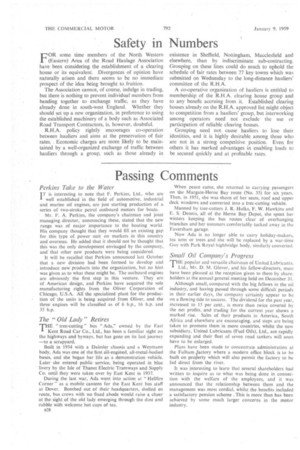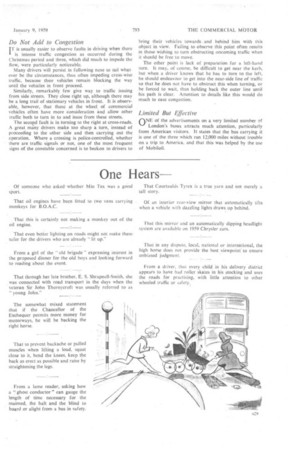Passing Comments
Page 32

Page 33

If you've noticed an error in this article please click here to report it so we can fix it.
Perkins Take to the Water
TT is interesting to note that F. Perkins, Ltd., who are I well established in the field of automotive, industrial and marine oil engines, are just starting production of a series of two-stroke petrol outboard motors for boats.
Mr. F. A. Perkins, the company's chairman and joint managing director, announcing these, stated that the new range was of major importance to the boating world. His company thought that they would fill an existing gap for this type of power unit on markets in this country and overseas. He added that it should not be thought that this was the only development envisaged by the company, and that other new products were being considered.
It will be recalled that Perkins announced last October that a new division had been formed to develop and introduce new products into the organization, but no hint was given as to what these might be. The outboard engines are obviously the first step in this venture. They are Of American design, and Perkins have acqffired the sole manufacturing rights from the Oliver Corporation of Chicago, U.S.A. All the specialized plant for the production of the units is being acquired from Oliver, and the three engines will be classified as of 6 h.p., 16 h.p. and 35 h.p.
The "Old Lady" Retires
THE " tree-cutting " bus "Ada," owned by the East Kent Road Car Co., Ltd., has been a familiar sight on the highways and byways, but has gone on its last journey —to a scrapyard.
Built in 1934 With a Daimler chassis and a Weymann body, Ada was one of the first Oil-engined, all-metal-bodied buses, and she began her life as a demonstration vehicle. Later she entered public service, being operated in blue livery by the Isle of Thanet Electric Train ways and Supply Co. until they were taken over by East Kent in 1937.
During the last war; Ada went into action at "Hellfire Corner" as a mobile canteen for the East Kent bus staff at Dover. Bombed out of their headquarters, shelled en route, bus crews with no fixed abode would raise a cheer at the sight of the old lady emerging through the dust and rubble with welcome hot cups of tea.
B28 When peace came, she returned to carrying passengers on the Margate-Herne Bay route (No. 35) for six years. Then. in 1951, she was shorn of her seats, roof and upper deck windows and converted into a tree-cutting vehicle.
Manned by tree-cutters J. R. Hulks, F. W. Hawkins and E. S. Dennis, all of the Herne I3ay Depot, she spent her winters keeping the bus routes . dear of overhanging branches and her summers comfortably tucked away in the Faversham garage.
Now Ada is no longer able to carry holiday-makers, tea urns or trees and she will be replaced by a war-time Guy with Park Royal highbridge body, similarly converted.
Small Oil Company's Progress
THE popular and versatile chairman of United Lubricants, I Ltd., Mr. D. M. Glover, and his fellow-directors, must have been pleased at the reception given to them by shareholders at the annual general meeting held on December 31.
Although small, compared with the big felloWs in the oil industry, and having passed through some difficult periods in their earlier days, the company certainly appear to be on a flowing tide to success. The dividend for the past year, increased to 15 per cent., is more than twice covered by the net profits, and trading for the current year shows a marked rise. Sales of their products in America, South Africa and elsewhere are encouraging, and steps are being taken to promote them in more countries, whilst the new subsidiary, United Lubricants (Fuel Oils), Ltd., are rapidly expanding and their fleet of seven road tankers will soon have to be enlarged.
Plans have been made to concentrate administration at the Fulham factory where a modern office block is to be built on proi3erty which will also permit the factory to be fed direct from the river.
It was interesting to learn that several shareholders had written to inquire as to what was being done in connection with the welfare of the employees, and it was announced that the relationship between them and the management was most cordial, whilst the benefits included a satisfactory pension scheme . This is more than has been achieved by some much larger concerns in the motor industry.
Do Not Add to Congestion
IT is usually easier to observe faults in driving when there I is intense traffic congestion as occurred during the Christmas period and three, which did much to impede the flow, were particularly noticeable.
Many drivers will persist in following nose to tail whatever be the circumstances, thus often impeding cross-wise traffic, because their vehicles remain blocking the way until the vehicles in front proceed.
Similarly, remarkably few give way to traffic issuing from side streets. They close right up, although there may be a long trail of stationary vehicles in front. It is observable, however, that those at the wheel, of commercial vehicles often have more consideration and allow other traffic both to turn in to and issue from these streets.
The secTd fault is in turning to the right at cross-roads. A great many drivers make too sharp a turn, instead of proceeding to the other side and then carrying out the operation. Where a crossing is police-controlled, whether there are traffic signals or not, one of the most frequent signs of the constable concerned is to beckon to drivers to bring their vehicles towards and behind him with this object in view. Failing to observe this point often results in those wishing to turn obstructing oncoming traffic when it should be free to move.
The other point is lack of preparation for a left-hand turn. It may, of course, be difficult to get near the kerb, but when a driver knows that he has to turn to the left, he should endeavour to get into the near-side line of traffic so that he does not have to obstruct this when turning, or be forced to wait, thus holding back the outer line until his path is clear. Attention to details like this would do much to ease congestion.
Limited But Effective
nNE of the advertisements on a very limited number of
London's buses attracts much attention, particularly from American visitors. It states that the bus carrying it is one of the three which ran 12,000 miles without trouble on a trip to America, and that this was helped by the use of lvlobiloil.
























































































































